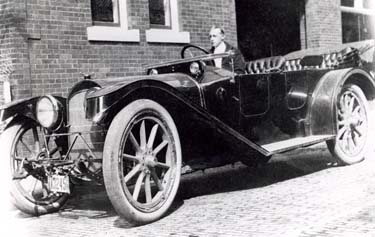The Norwalk
Martinsburg's Motor Car
By Daniel J. Friend
(Originally published in the Summer 2003 issue)

Brand new 1912 Norwalk Underslung Six being driven from the factory in Martinsburg. Photographer unknown.
In the early 1900's, a low-riding luxury car was built in Martinsburg's industrial center. The long and lavish Norwalk Underslung Six was billed as "The Car of Absolute Exclusiveness." It remains Martinsburg’s primary claim to automotive history and stands as the most successful and longest-made motor vehicle known to have been manufactured in the Mountain State.
The Norwalk Motor Car Company assembled cars and trucks from 1912 to 1922 on Miller Avenue — recently renamed Norwalk Avenue — located along the Winchester & Western Railroad tracks in Martinsburg's once‑thriving woolen mill district.
The auto manufacturer started in Norwalk, Ohio, in 1910. It faced financial trouble there, however, and a group of local investors bought out the company and its remaining parts stock, and moved everything to Martinsburg. The company began assembling the Underslung Six in 1912 in a building formerly occupied by the Brooklyn Brass Works.
The hulking Norwalk Underslung featured unique and expensive design concepts, many of which became standard features on later models. The Norwalk Underslung frame and suspension design lowered the car's center of gravity, making for less sway in curves. Engineers mounted the Norwalk's axles on top of the frame, while most manufacturers mounted the frame on top of the axles.
An advertisement in the 1913 edition of Motor magazine detailed the advantages of the low‑riding car. According to the advertisement, "The keynote of Norwalk Underslung construction lies in the fact that we have brought the center of weight, the point of suspension, and the point of support to coincide in practically one point. Flat springs are used all around, supported on top of the axle. Side sway and body swing are eliminated absolutely. In rounding corners, the centrifugal force is not taken up by the springs vertically, but the stress is lateral. As a result, the Norwalk, when rounding curves, carries the same weight on all four wheels as on the straightaway."
The standard Norwalk Underslung Six was a huge convertible with 40‑inch tires tall enough to bring the front fenders level with the plane of the hood. The tourer offered a 500-cubic-inch in‑line, 6‑cylinder, 8.6‑liter, overhead-valve engine. By comparison, one of today's larger engines used in many General Motors vehicles is the 350-cubic-inch, 5.7‑liter, V-8. With room for six passengers, the Underslung Six boasted a 136‑inch wheelbase. By comparison, a modern, full‑sized 2003 Cadillac Deville's wheelbase is 115.3 inches.
In 1912, the two‑passenger Underslung roadster was offered for $2,900, the three‑passenger roadster for $3,000, and the six-passenger tourer for $3,100. According to an advertisement, those prices got the owner the following equipment: "Top with curtains and cover, glass folding windshield, complete dynamo and battery, electric lighting system, self starter, speedometer, electric cigar lighter and trouble lamp, extra demountable rim, electric horn, coat rails, foot rails, trunk, all tools, etc."
A top‑of‑the‑line Underslung would cost a buyer about six times Henry Ford's $500-$600 price for a standard passenger car of the same era. Not a car for the common man, the Underslung was mainly marketed and sold in the more opulent sections of New York, Philadelphia, and Toronto.
"We're talking a lot of money for ol’ Martinsburgers in 1912," says Garry Murphy, historian for the Norwalk Antique Car Club of Martinsburg, named in honor of the local vehicle.
You can read the rest of this article in this issue of Goldenseal, available in bookstores, libraries or direct from Goldenseal.